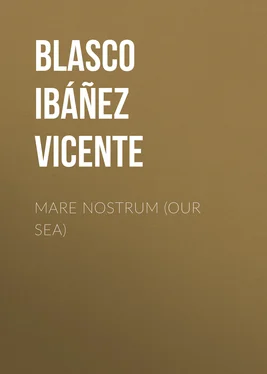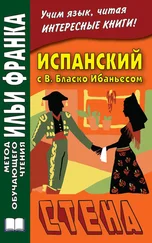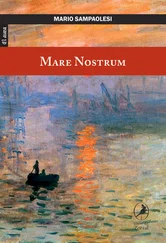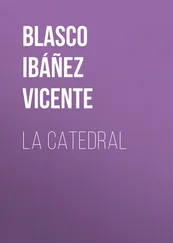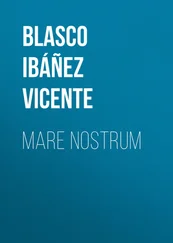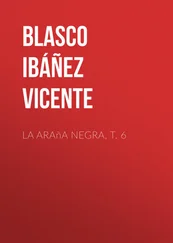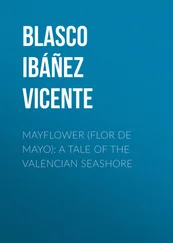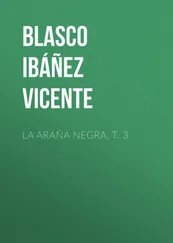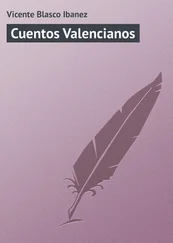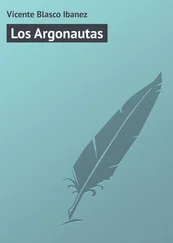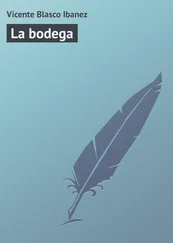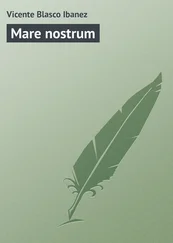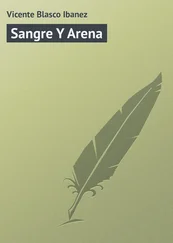Vicente Blasco Ibáñez - Mare Nostrum (Our Sea)
Здесь есть возможность читать онлайн «Vicente Blasco Ibáñez - Mare Nostrum (Our Sea)» — ознакомительный отрывок электронной книги совершенно бесплатно, а после прочтения отрывка купить полную версию. В некоторых случаях можно слушать аудио, скачать через торрент в формате fb2 и присутствует краткое содержание. Жанр: foreign_prose, foreign_antique, на английском языке. Описание произведения, (предисловие) а так же отзывы посетителей доступны на портале библиотеки ЛибКат.
- Название:Mare Nostrum (Our Sea)
- Автор:
- Жанр:
- Год:неизвестен
- ISBN:нет данных
- Рейтинг книги:5 / 5. Голосов: 1
-
Избранное:Добавить в избранное
- Отзывы:
-
Ваша оценка:
- 100
- 1
- 2
- 3
- 4
- 5
Mare Nostrum (Our Sea): краткое содержание, описание и аннотация
Предлагаем к чтению аннотацию, описание, краткое содержание или предисловие (зависит от того, что написал сам автор книги «Mare Nostrum (Our Sea)»). Если вы не нашли необходимую информацию о книге — напишите в комментариях, мы постараемся отыскать её.
Mare Nostrum (Our Sea) — читать онлайн ознакомительный отрывок
Ниже представлен текст книги, разбитый по страницам. Система сохранения места последней прочитанной страницы, позволяет с удобством читать онлайн бесплатно книгу «Mare Nostrum (Our Sea)», без необходимости каждый раз заново искать на чём Вы остановились. Поставьте закладку, и сможете в любой момент перейти на страницу, на которой закончили чтение.
Интервал:
Закладка:
Fragments of a conversation between his godfather and his father, who believed everything was already known regarding the surface of the earth, left him unconvinced. Something must still be left for him to discover! He was the meeting point of two families of sailors. His mother's brothers had ships on the coast of Catalunia. His father's ancestors had been valorous and obscure navigators, and there in the Marina was his uncle, the doctor, a genuine man of the sea.
When he grew tired of these imaginative orgies, he used to examine the portraits of different epochs stowed away in the garret. He preferred those of the women—noble dames with short-cropped, curled hair bound by a knot of ribbon on the temple, like those that Velazquez loved to paint, and long faces of the century following, with cherry-colored mouth, two patches on the cheeks, and a tower of white hair. The memory of the Grecian basilisa appeared to emanate from these paintings. All the high-born dames seemed to have something in common with her.
Among the portraits of the men there was one of a bishop that irritated him by its absurd childishness. He appeared almost his own age, an adolescent bishop, with imperious and aggressive eyes. These eyes used to inspire the sensitive lad with a certain terror, and he therefore decided to have done with them. "Take that!" and he ran his sword through the old chipped picture, making two gashes replace the challenging eyes. Then he added a few gashes more for good measure…. That same evening, his godfather having been invited to supper, the notary spoke of a certain portrait acquired a few months before in the neighborhood of Játiva, a city that he had always regarded with interest on account of the Borgias having been born in one of its suburbs. The two men were of the same opinion. That almost infantile prelate could have been no other than Caesar Borgia, made Archbishop of Valencia when sixteen years old by his father, the Pope. On their first free day they would examine the portrait with particular attention…. And Ulysses, hanging his head, felt every mouthful sticking in his throat.
For the fanciful lad, a pleasure even more intense and substantial than his lonely games in the garret was a visit to his godfather's home; to his childish eyes, this godparent, the lawyer, Don Carmelo Labarta, was the personification of the ideal life, of glory, of poesy. The notary was wont to speak of him with enthusiasm, yet pitying him at the same time.
"That poor Don Carmelo!… The leading authority of the age in civilian matters! By applying himself he might earn some money, but verses attracted him more than lawsuits."
Ulysses used to enter his office with keen emotion. Above rows of multicolored and gilded books that covered the walls, he saw some great plaster heads with towering foreheads and vacant eyes that seemed always to be contemplating an immense nothingness.
The child could repeat their names like a fragment from a choir book, from Homer to Victor Hugo. Then his glance would seek another head equally glorious although less white, with blonde and grizzled beard, rubicund nose and bilious cheeks that in certain moments scattered bits of scale. The sweet eyes of his godfather—yellowish eyes spotted with black dots—used to receive Ulysses with the doting affection of an aging, old bachelor who needs to invent a family. He it was who had given him at the baptismal font the name which had awakened so much admiration and ridicule among his school companions; with the patience of an old grand-sire narrating saintly stories to his descendants, he would tell Ulysses over and over the adventures of the navigating King of Ithaca for whom he had been named.
With no less devotion did the lad regard all the souvenirs of glory that adorned his house—wreaths of golden leaves, silver cups, nude marble statuettes, placques of different metals upon plush backgrounds on which glistened imperishably the name of the poet Labarta. All this booty the tireless Knight of Letters had conquered by means of his verse.
When the Floral Games were announced, the competitors used to tremble lest it might occur to the great Don Carmelo to hanker after some of the premiums. With astonishing facility he used to carry off the natural flower awarded for the heroic ode, the cup of gold for the amorous romance, the pair of statues dedicated to the most complete historical study, the marble bust for the best legend in prose, and even the "art bronze" reward of philological study. The other aspirants might try for the left-overs.
Fortunately he had confined himself to local literature, and his inspiration would not admit any other drapery than that of Valencian verse. Next to Valencia and its past glories, Greece claimed his admiration. Once a year Ulysses beheld him arrayed in his frock coat, his chest starred with decorations and in his lapel the golden cicada, badge of the poets of Provence.
He it was who was going to be celebrated in the fiesta of Provençal literature, in which he always played the principal role; he was the prize bard, lecturer, or simple idol to whom other poets were dedicating their eulogies—clerics given to rhyming, personifiers of religious images, silk-weavers who felt the vulgarity of their existence perturbed by the itchings of inspiration—all the brotherhood of popular bards of the ingenuous and domestic brand who recalled the Meistersingers of the old German cities.
His godson always imagined him with a crown of laurel on his brows just like those mysterious blind poets whose portraits and busts ornamented the library. In real life he saw perfectly well that his head had no such adornment, but reality lost its value before the firmness of his conceptions. His godfather certainly must wear a wreath when he was not present. Undoubtedly he was accustomed to wear it as a house cap when by himself.
Another thing which he greatly admired about the grand man was his extensive travels. He had lived in distant Madrid—the scene of almost all the novels read by Ulysses—and once upon a time he had crossed the frontier, going courageously into a remote country called the south of France, in order to visit another poet whom he was accustomed to call "My friend, Mistral." And the lad's imagination, hasty and illogical in its decisions, used to envelop his godfather in a halo of historic interest, similar to that of the conquerors.
At the stroke of the twelve o'clock chimes Labarta, who never permitted any informality in table matters, would become very impatient, cutting short the account of his journeys and triumphs.
"Doña Pepa!… We have a guest here."
Doña Pepa was the housekeeper, the great man's companion who for the past fifteen years had been chained to the chariot of his glory. The portières would part and through them would advance a huge bosom protruding above an abdomen cruelly corseted. Afterwards, long afterwards, would appear a white and radiant countenance, a face like a full moon, and while her smile like a night star was greeting the little Ulysses, the dorsal complement of her body kept on coming in—forty carnal years, fresh, exuberant, tremendous.
The notary and his wife always spoke of Doña Pepa as of a familiar person, but the child never had seen her in their home. Doña Cristina used to eulogize her care of the poet—but distantly and with no desire to make her acquaintance—while Don Esteban would make excuses for the great man.
"What can you expect!… He is an artist, and artists are not able to live as God commands. All of them, however dignified they may appear, are rather carnal at heart. What a pity! such an eminent lawyer!… The money that he could make…!"
His father's lamentations opened up new horizons to the little fellow's suspicions. Suddenly he grasped the prime motive force of our existence, hitherto only conjectured and enveloped in mystery. His godfather had relations with a woman; he was enamored like the heroes of the novels! And the boy recalled many of his Valencian poems, all rhapsodizing a lady—sometimes singing of her great beauty with the rapture and noble lassitude of a recent possession; at others complaining of her coldness, begging of her that disposition of her soul without which the gift of the body is as naught.
Читать дальшеИнтервал:
Закладка:
Похожие книги на «Mare Nostrum (Our Sea)»
Представляем Вашему вниманию похожие книги на «Mare Nostrum (Our Sea)» списком для выбора. Мы отобрали схожую по названию и смыслу литературу в надежде предоставить читателям больше вариантов отыскать новые, интересные, ещё непрочитанные произведения.
Обсуждение, отзывы о книге «Mare Nostrum (Our Sea)» и просто собственные мнения читателей. Оставьте ваши комментарии, напишите, что Вы думаете о произведении, его смысле или главных героях. Укажите что конкретно понравилось, а что нет, и почему Вы так считаете.
